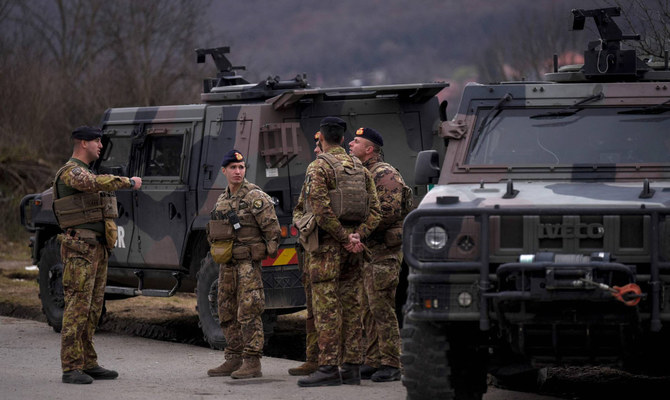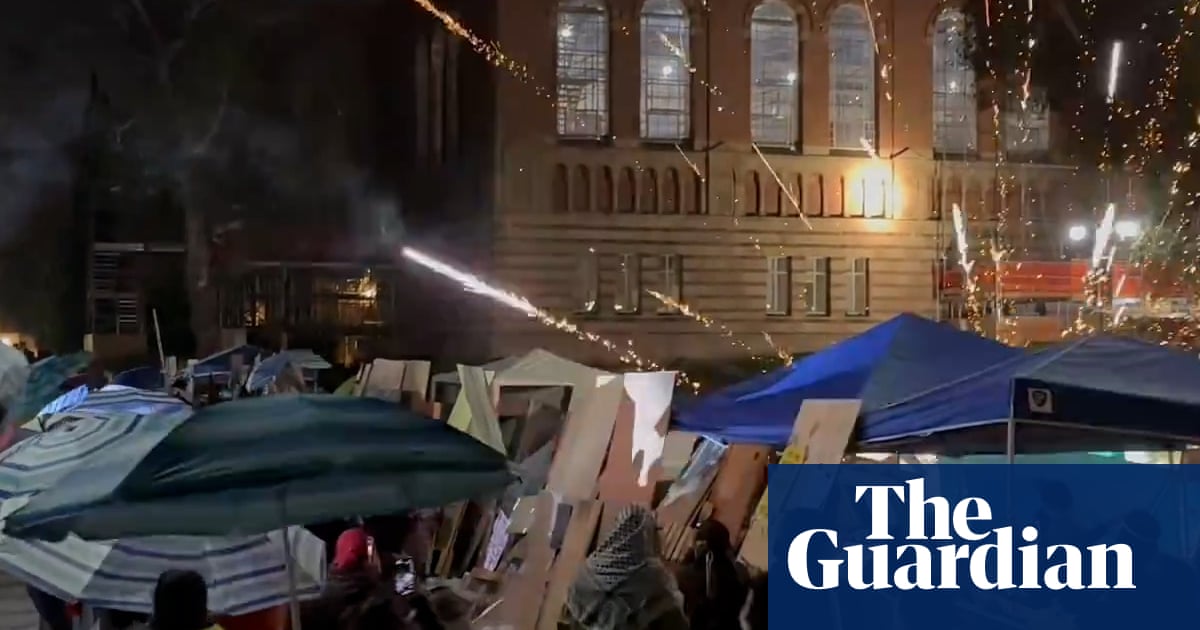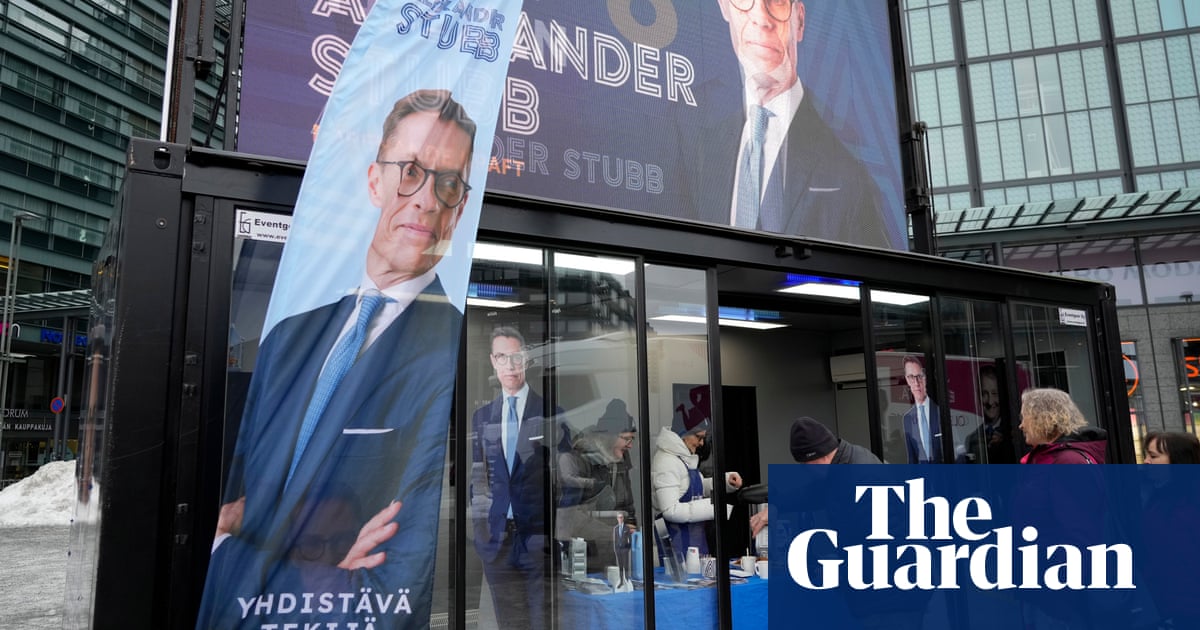
At an abandoned petrol station, half a mile from Kosovo’s Jarinje border checkpoint with Serbia, a giant Serbian flag had been laid out on the roof. In the former forecourt, a group of young people sat on upturned beer crates, sharing bottles of water and homemade rakija in small plastic cups. “This is our squad, our special forces,” one joked, as four tall, muscular men walked over to join them.
The mountain road next to them, flanked on either side by groups of protesters around tents and smouldering campfires, had been well and truly blocked by the men’s heavily laden trucks.
A minor protest, at first glance, made no less exotic by the fact that it was the result of a new motoring regulation. The blockade was being conducted by Serbs angered that vehicles carrying Serbian licence plates and entering Kosovo – which declared independence from Serbia in 2008 following the bloody 1998-99 civil war – were being told they had to replace them with temporary “RKS” Republic of Kosovo plates or turn round.
Yet for all that the scenes near the village of Jarinje may seem arcane to the wider world, this, for 12 days, has been the frontline of a tense standoff between Serbia and Kosovo over identity and sovereignty that offers a reminder to the wider world of the dangerous potential in this region’s unresolved tensions.
The blockade at the two border crossing by Serbs in Kosovo had led to the Kosovan government sending in their police special forces to keep the borders open. That was seen in Belgrade as provocation enough for the deployment of MiG fighter jets and tanks in scenes that sufficiently echoed the past for international leaders to feel a need to call for calm.
Kosovo’s police reported last weekend that one municipal building involved in issuing vehicle registrations had been burned down. A second had been attacked with grenades, which had failed to go off. Nato-led KFOR – which has had a peacekeeping role in Kosovo since 1999 – increased its patrols. Serbia’s defence minister came to survey the border, accompanied by Russia’s ambassador to Belgrade – an alarming spectre to many
A dispute over number plates had dangerously escalated.Lives had been put in danger Kosovo was back in the news for all the wrong reasons. And while, under an EU-mediated agreement, the blockaders and the Kosovan police withdrew on Saturday to allow politicians to find a compromise, those shuffling away from their camps freely admitted that nothing had been settled.
Milan, one of the protesters at the Jarinje blockade, conceded that ordinary people were becoming fed up with such periodic intensifications of political tensions and simply wanted to get on with their lives. “When I was younger, I used to be for some kind of an ethnic solution – even if arms were involved,” he said. “But since I’m a father now and married, I think differently. I just want a solution.”
Finding such an answer to the often parallel realities lived side by side in the region has been the ultimate aim of an EU-facilitated dialogue process that began in 2011. But, analysts say, it has never got to grips with the central issue: Serbia’s refusal to recognise Kosovo as an autonomous independent state.
To many observers, the developments over the last fortnight have highlighted the absence of international leadership on this issue, in particular by the EU.
Last week, the European Commission president, Ursula von der Leyen, emphasised that the future of the so-called “western Balkans six” – Albania, Bosnia and Herzegovina, Kosovo, North Macedonia, Montenegro and Serbia – was as members of the EU.
Yet, as with Serbia, China and Russia, five of the 27 EU member states – Slovakia, Romania, Greece, Cyprus and Spain - still do not recognise Kosovo, mainly for fear of encouraging the independence movements within their territories.
And while – before an EU heads of state and government summit in Slovenia on Wednesday with leaders of the western Balkans – some have spoken of setting a 2030 deadline for accession, others have laughed it off.
France’s president Emmanuel Macron has made it clear that given the degradation of the rule of law in Poland and Hungary, and the weakness of Brussels’ institutions in responding to that threat, the EU’s priority has to be on strengthening what they have. It is a “non” to enlargement from Paris.“The EU kind of, if I may so, appears as a schizophrenic actor, and it looks like the thing that really needs normalisation in all of this is the normalisation of the EU itself,” said Vjosa Musliu, assistant professor of international relations at the Vrije Universiteit Brussel. “Given its erratic stance towards the region, especially in the past weeks, the EU appears as the most abnormal actor in all of this setup.”
The EU has presented dialogue between Pristina and Belgrade as being merely technical but it is, in fact, deeply political and requires leadership, Musliu added: “You can’t just ignore the very big elephant in the room.”
The latest crisis had come about after part of a 2016 agreement reached in Brussels on provisional arrangements for vehicle licence plates expired. Under the new regulations announced by Kosovo’s government, “status neutral” licence plates that do not bear any Kosovo insignia are no longer valid. Serbian licence plates need to be replaced with temporary Republic of Kosovo plates.
The Kosovan prime minister Albin Kurti, from the Vetëvendosje [self-determination] party, who came to power in March after winning a landslide victory in the previous month’s general election, said the new rules on licence plates were simply part of a fresh approach of ensuring reciprocity in Kosovo’s relationship with Serbia.
The prevailing feeling among the majority Albanian population in Kosovo is that it is Belgrade that is responsible for denying freedom of movement, as people entering Serbia in vehicles with RKS licence plates have long had to remove them at the border and pay for temporary replacements.
Kurti conceded in an interview with the Observer that he had expected a row – but not on the scale of what emerged. “We predicted there would be a reaction, but not the reaction that would see MiG-29 fighter jets in the air and T-72 tanks at our border and then armoured vehicles and military combat vehicles. These were not predicted”.”
Kurti, who as an activist for Kosovan independence was jailed by both the governments of the then Socialist Federal Republic of Yugoslavia and then the Republic of Serbia, lays the blame for the latest tensions squarely on the shoulders of Serbian president Aleksandar Vučić, a former minister of information in the Slobodan Milošević administration. “Nowadays, more or less, Serbia does not recognise its neighbours who are not part of EU,” he said. “The stance of Belgrade is that Bosnia-Herzegovina, Montenegro, Kosovo and North Macedonia are temporary states that Serbia has either to control or to undo. If they don’t control you, they want to render you dysfunctional and turning into a failed state. In this sense, he is faithful to his origins.”
But Kurti also had a message to the EU. “I like the EU for its values, but I have a critique of the EU, but a critique without bitterness, because I want the EU to get better and not be dismantled,” he said. “The reason I cannot be bitter towards the EU is because some of the lack of trust that the EU has in us ‘western Balkan six’ is an expression of the lack of self confidence in itself. It is not that they hate us, it is that they don’t sufficiently trust themselves.”
The EU is preparing to pump €3.3bn into the western Balkans to help its recovery from Covid, a measure that Kurti likened to a “mini-Marshall plan”, similar to that rolled out by the US following the second world war. Despite recent events the Kosovan prime minister said he was not without hope.
“President Biden has put it very clearly that the centrepiece of an agreement is mutual recognition: Serbia does not recognise Kosovo, Kosovo does not recognise Serbia,” Kurti said. “We need mutual recognition. It is the concept with which we can move forward. It’s going to be very difficult, but then again, certain politicians when they see that the international community is serious, I think, more things are doable… All solutions depend less on imagination and creativity and more on readiness to change this mindset, this conviction, of Serbia, that’s its neighbours are not proper states.”












